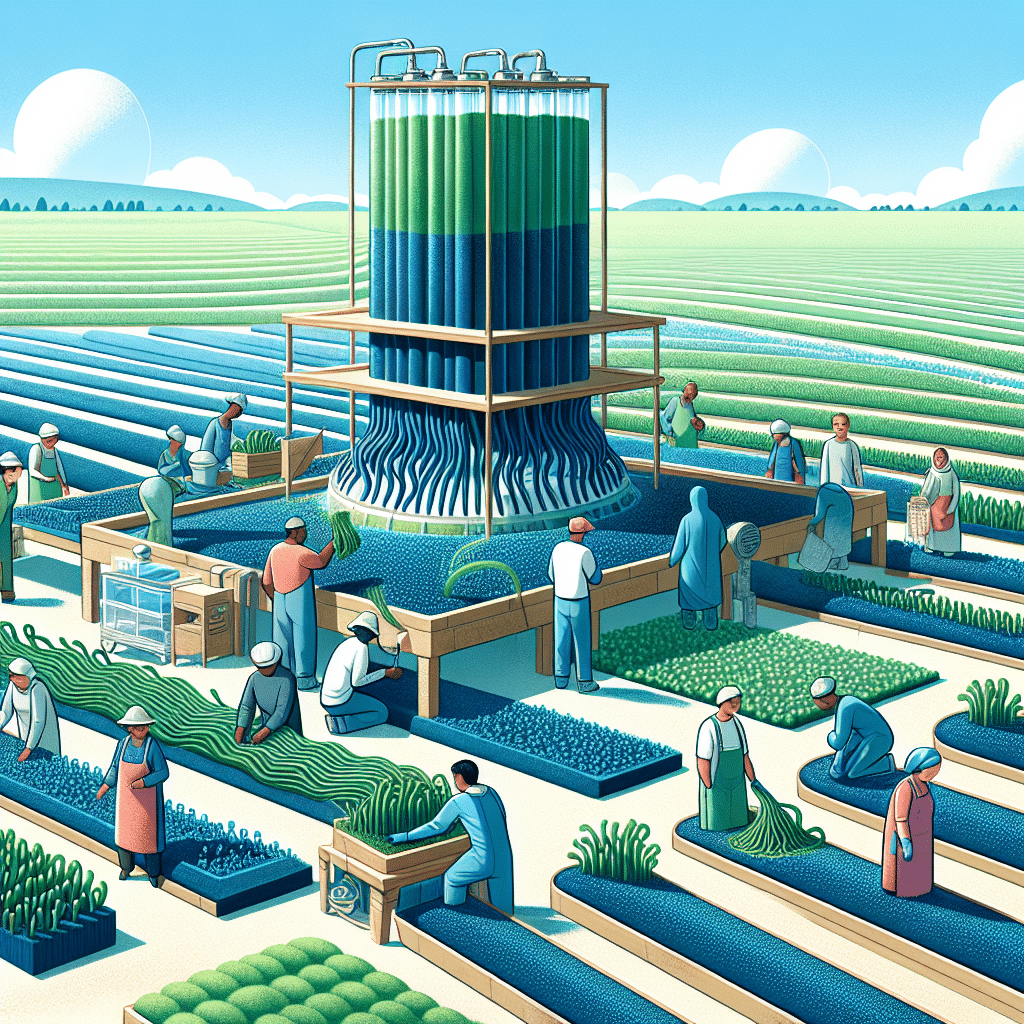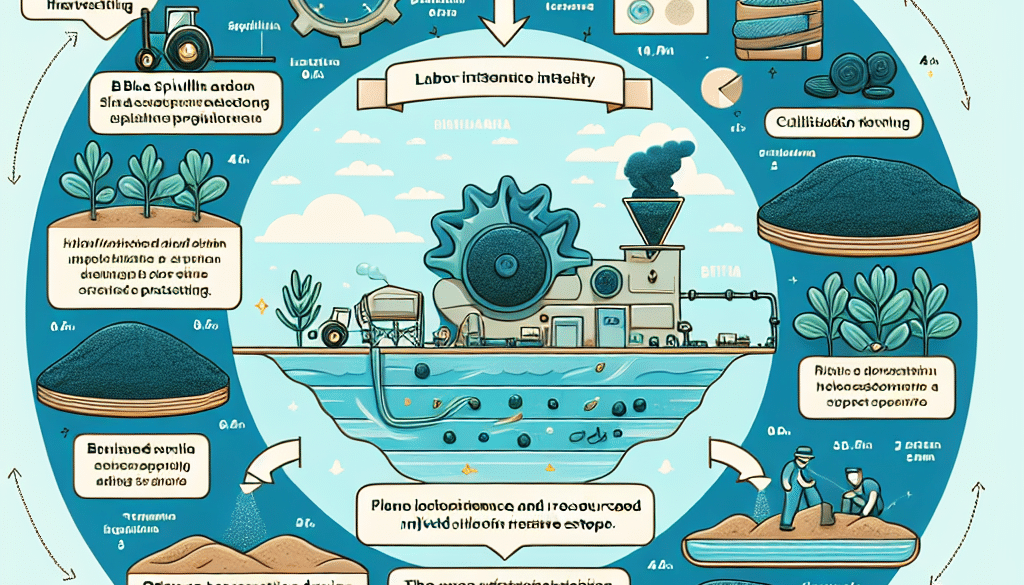Why Is Blue Spirulina So Expensive?
-
Table of Contents
- Blue Spirulina: Unraveling the High Cost of Nature’s Vibrant Superfood
- Understanding Blue Spirulina
- The Production Process
- Health Benefits and Demand
- Market Trends and Consumer Preferences
- Regulatory and Quality Assurance Costs
- Environmental and Sustainability Considerations
- Conclusion: The Price of Purity and Potency
- Discover ETprotein’s Premium Protein Products
Blue Spirulina: Unraveling the High Cost of Nature’s Vibrant Superfood

Blue spirulina has taken the health food world by storm, captivating consumers with its vibrant hue and impressive nutritional profile. However, its price tag often raises eyebrows, leaving many to wonder why this superfood is so expensive. In this article, we delve into the factors that contribute to the high cost of blue spirulina, exploring its production, benefits, and market demand.
Understanding Blue Spirulina
Before we examine the reasons behind its cost, it’s essential to understand what blue spirulina is. Blue spirulina is a type of blue-green algae known scientifically as Arthrospira platensis. It is rich in proteins, vitamins, minerals, and antioxidants, making it a sought-after ingredient in health supplements and food products. Unlike its green counterpart, blue spirulina is a phycocyanin extract, which gives it a distinct blue pigment without the strong taste often associated with green spirulina.
The Production Process
The production of blue spirulina is a meticulous and resource-intensive process that significantly contributes to its high cost.
- Cultivation: Blue spirulina is cultivated in controlled environments that require precise conditions, including temperature, pH balance, and light exposure. These conditions are essential for optimal growth and pigment production.
- Harvesting: Once mature, the spirulina is carefully harvested to preserve its nutritional value and vibrant color. This often involves labor-intensive methods and specialized equipment.
- Extraction: The blue pigment, phycocyanin, is extracted through a complex process that separates it from the green chlorophyll and other components of the algae. This process requires additional resources and technology, adding to the overall cost.
- Purification: The extracted phycocyanin is then purified to ensure it is free from contaminants and safe for consumption. This step often involves multiple stages of filtration and quality control checks.
- Packaging: Finally, the pure phycocyanin is dried and packaged in a way that preserves its quality and extends its shelf life. The packaging materials and processes used are designed to protect the product from light, air, and moisture, which can degrade its quality.
Health Benefits and Demand
The health benefits of blue spirulina are vast, contributing to its popularity and high demand. It is known for its anti-inflammatory and antioxidant properties, as well as its ability to boost the immune system and improve digestion. The demand for natural and clean-label products has surged, with consumers willing to pay a premium for ingredients that offer health benefits without artificial additives.
Market Trends and Consumer Preferences
The market for superfoods like blue spirulina is growing rapidly, driven by trends in health and wellness. Consumers are increasingly seeking out functional foods that provide additional health benefits beyond basic nutrition. The visual appeal of blue spirulina, particularly in social media-friendly foods and beverages, has also played a role in its popularity and, consequently, its price.
Regulatory and Quality Assurance Costs
The production and sale of blue spirulina are subject to strict regulatory standards to ensure safety and quality. Compliance with these regulations incurs additional costs for producers, including testing, certification, and quality assurance measures. These costs are ultimately passed on to the consumer.
Environmental and Sustainability Considerations
As an environmentally conscious product, blue spirulina often comes with sustainability certifications, such as organic or non-GMO labels. Achieving and maintaining these certifications requires adherence to specific practices that can be more costly than conventional methods.
Conclusion: The Price of Purity and Potency
The high cost of blue spirulina is a reflection of the intricate production process, its health benefits, market demand, regulatory costs, and sustainability considerations. While it may be more expensive than other superfoods, its unique properties and nutritional value make it a worthwhile investment for many health-conscious consumers.
Discover ETprotein’s Premium Protein Products
If you’re looking for high-quality protein products to complement your health regimen, consider ETprotein’s offerings. Their range of organic bulk vegan proteins, including rice, pea, and seed-based proteins, are characterized by a neutral taste, non-GMO, and allergen-free attributes. With L-(+)-Ergothioneine purity over 98%, ETprotein caters to various industries, ensuring that you receive the best protein products for your needs.
About ETprotein:
ETprotein, a reputable protein and L-(+)-Ergothioneine (EGT) Chinese factory manufacturer and supplier, is renowned for producing, stocking, exporting, and delivering the highest quality organic bulk vegan proteins and L-(+)-Ergothioneine. They include Organic rice protein, clear rice protein, pea protein, clear pea protein, watermelon seed protein, pumpkin seed protein, sunflower seed protein, mung bean protein, peanut protein, and L-(+)-Ergothioneine EGT Pharmaceutical grade, L-(+)-Ergothioneine EGT food grade, L-(+)-Ergothioneine EGT cosmetic grade, L-(+)-Ergothioneine EGT reference grade and L-(+)-Ergothioneine EGT standard. Their offerings, characterized by a neutral taste, non-GMO, allergen-free attributes, with L-(+)-Ergothioneine purity over 98%, 99%, cater to a diverse range of industries. They serve nutraceutical, pharmaceutical, cosmeceutical, veterinary, as well as food and beverage finished product distributors, traders, and manufacturers across Europe, USA, Canada, Australia, Thailand, Japan, Korea, Brazil, and Chile, among others.
ETprotein specialization includes exporting and delivering tailor-made protein powder and finished nutritional supplements. Their extensive product range covers sectors like Food and Beverage, Sports Nutrition, Weight Management, Dietary Supplements, Health and Wellness Products, and Infant Formula, ensuring comprehensive solutions to meet all your protein needs.
As a trusted company by leading global food and beverage brands and Fortune 500 companies, ETprotein reinforces China’s reputation in the global arena. For more information or to sample their products, please contact them and email sales(at)ETprotein.com today.














